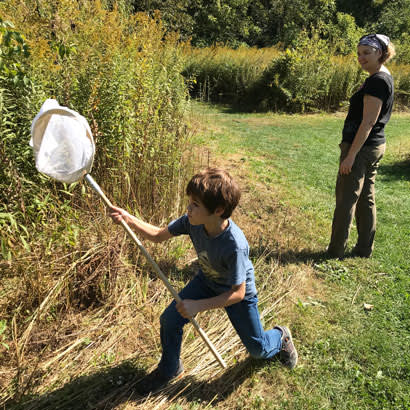
“The prairie in Whetstone Park has been transformed from a nuisance back into a unique landscape that offers escape from the hustle and bustle of the city,” reported ThisWeek News in September 2019.
Conservation is one of the pillars of the recreation and parks profession. Since 2018, Columbus Recreation and Parks Department (CRPD) has worked with the community to restore an urban prairie in the heart of Columbus, Ohio.
Prairies once stretched across the Midwest. Grasses and wildflowers thrived because the ecosystem was “disturbed” — fires burned frequently and bison grazed. Prairies are a part of our heritage and provide habitat for pollinators and other wildlife.
The Whetstone Prairie was first developed in 2004 with grant funding and volunteer support. It offers a unique habitat in Whetstone Park, close to Ohio State University and a popular bike trail. Several controlled burns took place with the help of partners. From 2010-2018, however, a burn was unable to take place due to the recession. Saplings grew tall and overtook the native grasses.
As conservation professionals, we knew it was time to safeguard this unique resource. The Whetstone Prairie is the city of Columbus’ only restored prairie, and the community reached out with safety and environmental concerns of tall vegetation taking over the prairie. CRPD created a five-year plan to restore the prairie to its previous splendor and make its management sustainable. Part of the prairie that was thick with trees was designated as forest, allowing focused management on areas prairie plants would thrive. As one resident said, “I love the prairie but have been quite dissatisfied lately due to the overgrowth...I appreciate that there is now a plan.”
CRPD was fortunate to receive a $20,000 Parks for Pollinators grant through NRPA and The ScottsMiracle-Gro Foundation. This grant has funded the restoration of the Whetstone Prairie, as well as helped provide education on pollinators for local children and families.
For the past two years, we have developed a seasonal management pattern. We recognize that mowing when we cannot burn is important to maintain the prairie. In April 2019, over 100 volunteers planted wetland plants around two vernal pools within the prairie. Volunteers help us control weeds in the summer and fall, and for the first time last fall, volunteers collected seeds from Whetstone Prairie to use in other parks. Since this project has been met with such success, we are implementing prairie restoration in more parks and using Whetstone as our model.
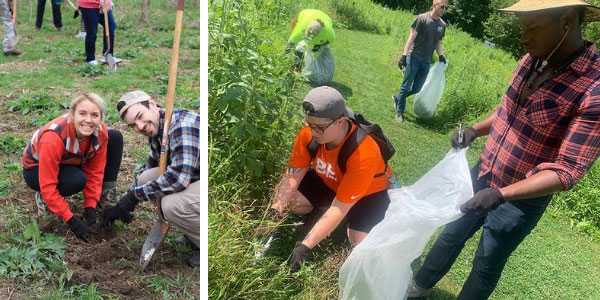
Volunteers at Whetstone Prairie. Photos courtesy of Columbus Recreation and Parks Department.
The Whetstone Prairie is also meeting its management goals. From plant surveys in 2017 and 2019, we know the overall species in the prairie increased, providing better habitat for wildlife. Native, non-woody species have more than doubled. One goal was to reduce woody species in the prairie, and they have been reduced by two-thirds. Woody invasive plants were eliminated entirely, and invasive species also decreased.
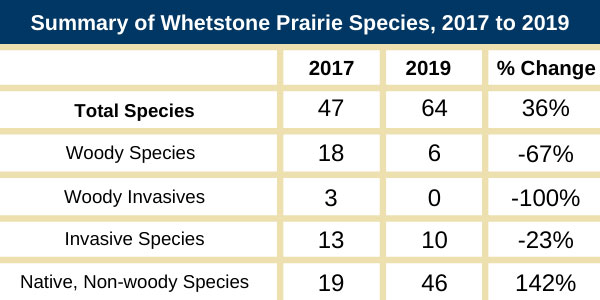
Community support for this project has been amazing! Columbus residents are curious about the work we are doing and the future plans for this prairie. Educational signage demonstrates the benefits of pollinators, and walking paths allow for prairie exploration. Volunteers regularly assist with workdays, and we often have families join events to learn more and then decide to help.
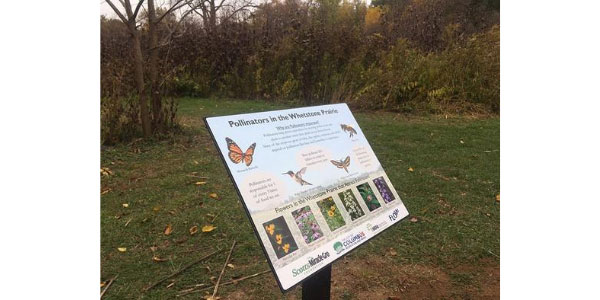
Educational signage about pollinators. Photo courtesy of Columbus Recreation and Parks Department.
Several high-profile community events have brought attention to pollinators. In June 2019, CRPD partnered with the Franklin Park Conservatory for Pollinator Palooza, a community-wide celebration of pollinators. CRPD hosted a BioBlitz so attendees could use the iNaturalist app to record and learn about the hundreds of pollinators thriving in Franklin Park. We also created a scavenger hunt with printed pictures so families could locate pollinators without relying on a smartphone. In October 2019, the Whetstone Prairie hosted our first annual Pollinator Field Day. This family-friendly event included field games about bees and butterflies; guided tours of the prairie; monarch butterfly catch, tag, and release; Master Gardener volunteers advising how to start pollinator gardens at home, and volunteering to collect seed or weed the prairie.
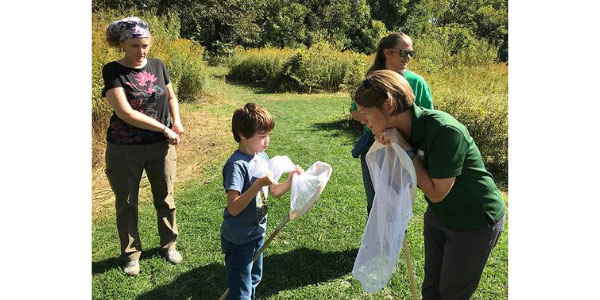
Staff and participants at the Pollinator Field Day in 2019. Photo courtesy of Columbus Recreation and Parks Department.
To celebrate Pollinator Month this year, CRPD had planned on hosting a BioBlitz in June 2020 at the Whetstone Prairie. Due to COVID, we are holding an amended version in September. The BioBlitz will be part of this year’s Pollinator Field Day. Attendees will use iNaturalist to document species and learn about the prairie through guided tours provided by staff, as well as watch butterfly catch and release demos. We will provide volunteer opportunities to assist with weeding and collecting seed. The event will be COVID-safe with pre-registration to keep groups small, as well as masks and social distancing.
Do you have an area in one of your parks you would like to stop mowing? Pollinator plantings are a beautiful way to increase wildlife habitat and reduce mowing frequency. Restoring a prairie provides the community with the chance to learn about pollinators on their own or through community events. The Whetstone Prairie demonstrates the power of collaboration when it comes to conservation.
Interested in learning more about BioBlitzes? You can also sign up to host a Parks for Pollinators BioBlitz this September in your own community and receive tools to help you plan a virtual event with physical distancing in mind. If your agency signs up to host a BioBlitz during the month of September, not only will you be helping raise pollinator awareness, you will also be entered to win a $1,000 prize and one of three ScottsMiracle-Gro prize packs to help with your pollinator habitats or programs!
The Parks for Pollinators campaign, hosted through a partnership between the National Recreation and Park Association (NRPA) and The ScottsMiracle-Gro Foundation, aims to raise public awareness of the pollinator crisis and encourage local action through public parks and recreation. NRPA and The ScottsMiracle-Gro Foundation believe parks play a key role in protecting and preserving pollinators and their habitats. Together, as part of the ScottsMiracle-Gro’s GroMoreGood initiative, they are working to educate more children, families and communities about the importance of pollinators and what people can do to help.
Betty Blockinger is the Volunteer Manager for the Columbus Recreation and Parks Department and Rosalie Hendon is the Environmental Planner for Columbus Recreation and Parks Department.

